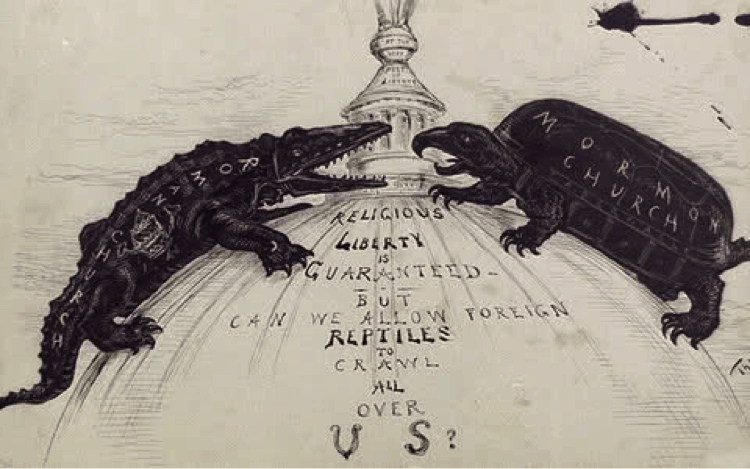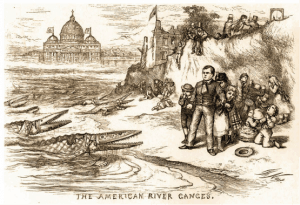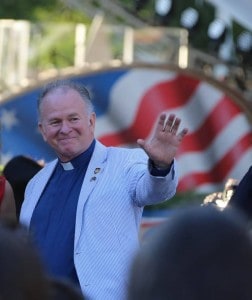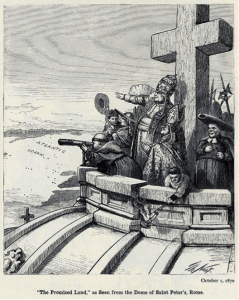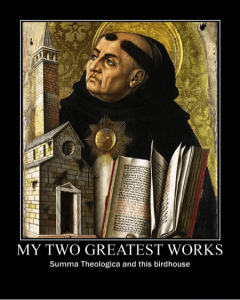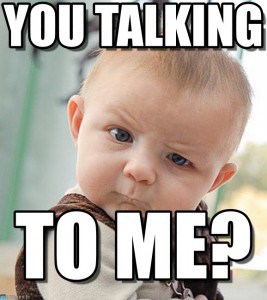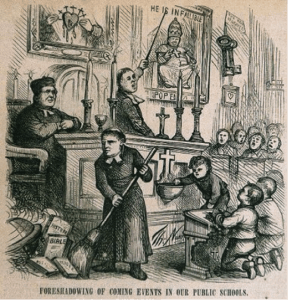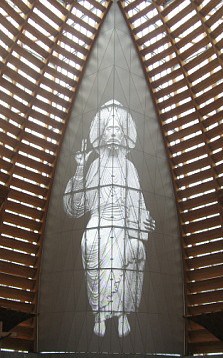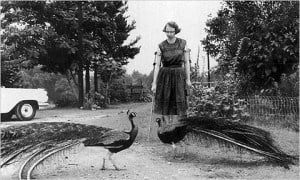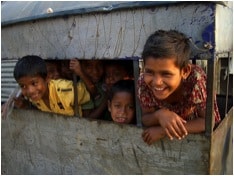Those readers with a pulse have noticed much media focus on what it means to be both American and Christian. Is America ‘still’ a Christian nation? Will Christians become a new persecuted minority? There has been much ink spilt on issues of the environment, sexuality, health care, etc., and how they rankle religious groups in the United States. Some of the commentary is balanced and thoughtful; much of it puts off more heat than light.
“May you live in interesting times.” We are told this is an old Chinese curse. It turns out that “may you live in interesting times” is not actually a thing in Chinese; but saying so gives it a hint of Eastern mystique, no? The past few months have indeed been an interesting time to be American. Whether it has been a curse or blessing depends on several factors, one of which — we are told by social media — is our religious belief.
As an American and a Catholic, I actually love living in these interesting times. The issues today invite us to live our faith, and citizenship, in an integrated way. A century ago, Harper’s political cartoonist Thomas Nast mongered fear about Irish Catholics’ increasing influence in American culture, politics, and education. One wonders if he had any idea of the interesting times that American Catholics would inherit, inhabit, and influence in 2015.
What follows is not about politics, or platforms, but about what unites a people — as Catholic and American. Whether you are Catholic or American (or both, or neither), we hope you enjoy considering The Jesuit Post’s…
10 Reasons to Love Being American and Catholic
1) We care deeply about our country, and so we get involved. As Pope Francis writes in Joy of the Gospel, an active faith community “gets involved by word and deed in people’s daily lives; it bridges distances, it is willing to abase itself if necessary, and it embraces human life…Evangelizers thus take on the ‘smell of the sheep’ and the sheep are willing to hear their voice.” Notice how often Catholic politicians are asked whether their faith influences their politics? People wondered 50 years ago whether President Kennedy was a secret puppet of the pope, trying to overthrow the US. Today, the chaplain to the House of Representatives is a Catholic priest, Fr. Pat Conroy. (Notate bene, internet conspiracy theorists!)
In our current (114th) Congress, Catholics make up the largest single group (164 of 535, or 30.7%). But being Catholic does not imply uniformity of thought. And that’s because…
2) Like a family, we love each other – and we often disagree. You need a lot of shared history and values to achieve actual, productive disagreement. Jesuit John Courtney Murray wrote that “disagreement is a rare achievement, and most of what is called disagreement is simply confusion.” Recent debates about health care, the environment, and same-sex marriage are heated topics for us Catholics, and rightly so. They force us to consider and weigh our shared values.
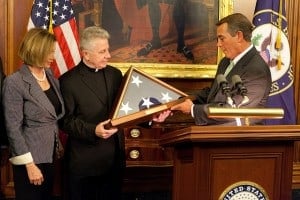
John Boehner and Nancy Pelosi honor Father Daniel P. Coughlin for his service as the 59th Chaplain of the House of Representatives. Available on Flickr at www.flickr.com/photos/speakerboehner/
We Catholics believe in the dignity of each person, the centrality of the family, the care for the poor, the inviolability of conscience, and the goodness of creation. Unsurprisingly, how we apply these values to controversies in America leads Catholics of good will to disagree. Which reminds me: of the 164 Catholics in the current Congress, 83 are Democrats, and 81 are Republican.[1] There are six Catholics on the Supreme Court, and they rarely all agree with one another. (For the record, there are six Catholics in my own family, and we rarely all agree, either.)
Sadly, we don’t always publicly disagree well, and it can get messy. But at our best, we do not just talk past one another, we legitimately and reasonably disagree. (Consider this spirited exchange between Catholic-turn-Orthodox writer Rod Dreher and Catholic writer Kaya Oakes.) A faith tradition that admits diversity of thought is attractive, as long the dialogue to which it gives birth is rooted in truth and love.
But the Catholic family is bigger than the US alone, and…
3) Increasingly, Catholics in America reflect the wider world and its concerns. In 2007, 2 out of 3 Catholics in the US were white. Only seven years later, 41% of Catholics in the US are not of European ancestry – Latinos, Africans, African-Americans, Indians, Asians, etc.[2] Newer Catholic immigrants bring to the US issues and concerns that face the wider world — and we should be grateful for that broader vision. We American Catholics sometimes get upset when our issues do not seem to be as pressing for the rest of the Catholic world. But when we recall that the US Catholic Church accounts for only 6% of the entire Church, it puts our pressing issues in perspective. The Catholic Church is not a good place if you are afraid of encountering others, especially others in need. It is, however, a good bellwether of the makeup of the United States in the near future.
Just as important as the future, is where we have come from. That is because…
4) Our history is important to us – because it has recorded and shaped much of our culture. Through the centuries, the Catholic Church has preserved and developed ancient authors’ texts and ideas. Augustine of Hippo wrote the first tell-all autobiography, and he wrestled with age-old questions of good and evil. Remote Catholic monasteries served as a beacon of intellectual life as the ‘dark ages’ and plagues ravaged much of Europe.
Thomas Aquinas, a thunder-thinker of the thirteenth century, was dialoguing with Jewish and Muslim scholars about Aristotle long before interreligious dialogue was hip. Bartolomé de las Casas, a Dominican friar, wrote passionately about the evils of slavery and colonialism in the 1500s, long before post-colonial theory hit the scene. Jesuit missionaries studied the stars, recorded languages throughout South America and Asia, and adapted to the cultures of local peoples. Jesuits also defended the indigenous Guarani against European colonial powers in South American communities.
But what about the darker side of the Church’s history? This leads us to number five:
5) Yes, we know about the Crusades…and Galileo…and the Inquisition. We’re not proud of them, and we can’t take them back – but we can apologize for them. At a solemn penance service in Rome on March 12, 2000, Pope John Paul II begged forgiveness for the sins committed by members of the Catholic Church over the past 2,000 years, especially those which caused division among Christians.[3] Pope Francis recently did the same to indigenous peoples of the Americas: “I humbly ask forgiveness, not only for the offenses of the church herself, but also for crimes committed against the native peoples during the so-called conquest of America.”[4] We cannot rewrite history, but we can take ownership of our mistakes, seek forgiveness, and hope to live on.
We also know that probing the past opens a Pandora’s box, full of many other sad tales. If we really want to comb through history, we should consider the bloody French Revolution, Stalin’s mass-extermination of Christians, Hitler’s Third Reich, and Pol Pot’s Khmer Rouge. Each of these are instances where non-religious leaders perpetrated violence against their own (often religious) people, in the vaunted pursuit of humanism and freedom. To be clear: these examples do not excuse the Church’s sins — but they do remind us that an honest assessment of history leaves few innocent parties. [Just sayin’.] All that to say…
6) American Catholics are not perfect – and we know it. Fr. Pedro Arrupe, SJ said of his own Jesuits in 1981, “we are not as bad as people say we are, nor are we as good as people think we are.” The same could be said for us Catholics. The sexual abuse crisis, and issues of exclusion, merit earnest soul searching for us. We can be sinners — petty and prideful, hypocritical and selfish, garrulous and quarrelsome — just like everyone else in the human family. And our faith happily admits this fault, and challenges us all to be truer to God, to ourselves, and to our neighbor. After he decried broad-ranging social issues in his visit to Paraguay, Pope Francis challenged each person in the audience to personal soul-searching: “The worst thing that can happen to each one of you is that when you leave this place you think, ‘The pope was talking to this or that guy.’ If anyone of you thinks like that, stop it! Who was the pope talking to? To me!”
In other words, our faith recognizes us as sinners, but calls us each to be saints. And there are many shining examples of these saints. Consider the fact that…
7) The Catholic Church is the largest single provider of education and health care in the world. In the United States alone, 1 in 6 patients is treated in a Catholic hospital. The cost of running these 645 non-profit hospitals is $108 billion per year.[5] Catholic Charities provides housing, hunger, and health services to hundreds of thousands of people annually. Catholic Relief Services and Jesuit Refugee Services offer disaster relief across the globe; they work to resettle, care for, and educate refugees all over the world, regardless of their religion. US Catholic grade schools provide affordable, quality education in every major US urban area — long after Catholic immigrant populations have moved out to the suburbs. Catholics educate those in greatest need not because the students are Catholic, but because we are. And have you read about Cristo Rey schools?
Focusing and coordinating all this good work means that…
8) We have rules, yes. But at our core, Catholicism is about following Jesus. Anything worth belonging to – a family, a club, a church – has legitimate expectations that flow from its mission. But even we might miss the forest for the trees. As Pope Francis says, “The church sometimes has locked itself up in small things, in small-minded rules. The most important thing is the first proclamation: Jesus Christ has saved you.”[6] From that relationship with Jesus flows an important belief: God yearns to be present in this world. The sacraments of the Church — especially the Eucharist — remind us that Jesus took on our humanity and promised to be with us until the end. We are spiritual beings, yet we live in physical time and space. It’s no surprise, then, that we believe that God is laboring — laboring! — through different cultures and rituals, which are earthy, sensory, and beautiful. Our sacraments, our lives, and our relationships strive to make Jesus present in the world. And to do that, we do well to recall that…
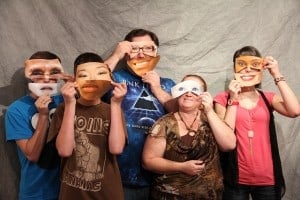
Available from George A. Spiva Center for Arts on Flickr: https://www.flickr.com/photos/spivaartworkers
9) Without exception, we are loved and lovable in God’s eyes. Pope Francis again: “A person once asked me, in a provocative manner, if I approved of homosexuality. I replied with another question: ‘Tell me: when God looks at a gay person, does he endorse the existence of this person with love, or reject and condemn this person?’ We must always consider the person.” Catholic thinking begins with the relationship of God’s love for us. And that relationship teaches us how we belong to one another, regardless of race, religion, gender, sexuality, or social status. Catholics are called to care for those whom our culture easily overlooks: the unborn, the elderly, the poor, the immigrant, the outcast, and the prisoner. Catholic Social Teaching, a great guidebook of how we should live justly in a complex world, speaks thoughtfully about all of these issues. Better still, Catholic Social Teaching is like Jesus — it upsets our too-easy American political categories. Our faith afflicts the comfortable and comforts the afflicted. If it doesn’t make us comfortable Americans re-consider how we fit into the larger world, it’s not doing its job. And finally,
10) Catholics are walking paradoxes — and we love it. We recognize sacred whispers in the profane, and that makes for good storytellers. (Think of Flannery O’Connor, Cormac McCarthy, Tobias Wolff, or Gerard Manley Hopkins.) We pursue truth and avoid easy answers; yet at our best we welcome questions of seekers. We have remote mystics who avoid city life, and those who throw themselves into caring for the urban poor. We have saints who write scholarly books, and those who write emotional tell-all autobiographies. We are complex or simple; cheerful or dour. We love beer and wine, and know how to celebrate life’s great feasts; yet when the time comes, we know the value of mourning and fasting from the world. We speak of sin, but we also speak of grace. We find God alive in beautiful music and art; but also in the wizened face of a homeless addict. We call others to repentance, when we ourselves stand in constant need of forgiveness. We teach the rich and the poor alike, and pray they encounter one another. We write listicles patting ourselves on the back, both to encourage ourselves and to call us to greater authenticity.
We aim for eternal life with God in the next world, without losing hope for this one. Because though these are interesting times for American Catholics…they are anything but a curse.

